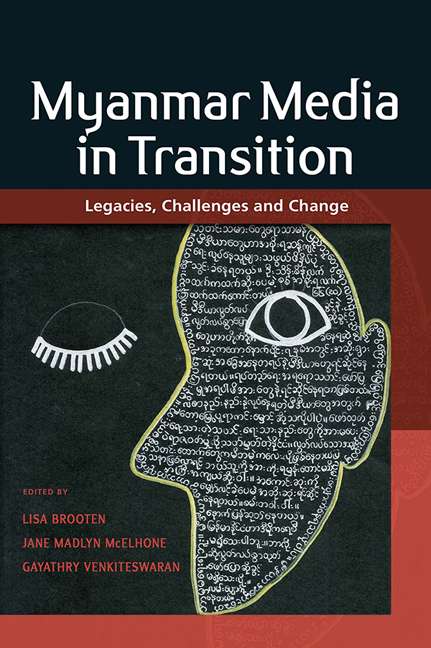Book contents
- Frontmatter
- Contents
- Contributors and Editors
- Burma or Myanmar? A Note on Terminology
- 1 Introduction: Myanmar Media Historically and the Challenges of Transition
- Part I Structural Constraints and Opportunities
- Part II Journalism in Transition
- Part III Creative Expression
- Part IV Society and Media
- 18 The Tea Shop Meets the 8 O'clock News: Facebook, Convergence and Online Public Spaces
- 19 From Blogging to Digital Rights: Telecommunications Reform in Myanmar
- 20 Counter-Narratives: Myanmar's Digital Media Activists
- Epilogue: Media Studies in Myanmar – Where Do We Go from Here?
- Index
20 - Counter-Narratives: Myanmar's Digital Media Activists
from Part IV - Society and Media
Published online by Cambridge University Press: 07 September 2019
- Frontmatter
- Contents
- Contributors and Editors
- Burma or Myanmar? A Note on Terminology
- 1 Introduction: Myanmar Media Historically and the Challenges of Transition
- Part I Structural Constraints and Opportunities
- Part II Journalism in Transition
- Part III Creative Expression
- Part IV Society and Media
- 18 The Tea Shop Meets the 8 O'clock News: Facebook, Convergence and Online Public Spaces
- 19 From Blogging to Digital Rights: Telecommunications Reform in Myanmar
- 20 Counter-Narratives: Myanmar's Digital Media Activists
- Epilogue: Media Studies in Myanmar – Where Do We Go from Here?
- Index
Summary
Eventually it would help her understand comments on her Facebook feed, like “Kalars should get out of our country” and “Kalars are setting our country on fire”. A gift to her from her father when she passed her school matriculation exam, her vintage radio played the BBC, Voice of America, and Radio Free Asia for three hours every morning and night. She listened to it faithfully, earning her the nickname “grandmom”. Then, in 2012, when Khin Oo was 28, her radio reported that violence had broken out between Rakhine Buddhists and Rohingya Muslims in Rakhine State.
Khin Oo is Muslim. She has a small frame and speaks in whispers. “I love getting and sharing information”, she told me. After the 2012 Rakhine riots, and what she learned from the news, she said, “I knew I needed to work for peace and educate my people and those who hate us.” She set her sights on working in Mandalay, a town a few hours away from her home in Shan State, with an organization working to promote peace and education.
Khin Oo finally made it to Mandalay in 2014, where she began working with a peace organization, and also enrolled in law school. The deadly beating of a young Buddhist man that same year, publicized on Facebook, led to an unexpected beginning. “Muslims are responsible for the beating” and “Muslims should leave the country” someone behind her said when he thought she could not hear. No one would sit near her in class after the beating. One day, in her second year of school, she saw several posts on her Facebook newsfeed about a monk who had fallen in the market. The posts said a woman, said to be Muslim, tripped him. Users threatened revenge against the Muslim responsible, and others weighed in with slurs against the Muslim faith. The next day, mobs burned several shops and homes in retaliation. The truth, she later learned, was that a young Muslim girl had accidentally run into a monk, causing him to fall. A minor incident had escalated into an aggressive act, leading people to blame a religious community, wrongly, and to commit acts of violence for revenge. She saw what could happen when people take action based on incomplete or incorrect information.
- Type
- Chapter
- Information
- Myanmar Media in TransitionLegacies, Challenges and Change, pp. 377 - 386Publisher: ISEAS–Yusof Ishak InstitutePrint publication year: 2019



